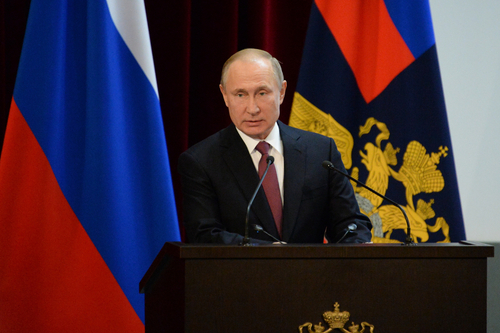|
|
Western countries, led by the U.S., have imposed a historic amount of sanctions on Russia after its decision to invade Ukraine, which have inflicted serious pain on all parties involved.
The Trends Journal reported last week that the latest arrow in the West’s quiver would be to impose a price cap on Russian oil, which seems to border on fantasy. (See “DELUSION RULES: G7 MEMBERS AIM FOR PRICE CAP ON RUSSIAN OIL.”)
Russian President Vladimir Putin said the world needs to be prepared for “catastrophic consequences” if there are additional sanctions leveled at Russia. He admitted to his parliament that the Western sanctions have been painful for Russia, but insisted that the pain felt by the West has been worse.
“The further use of sanctions could lead to even more severe consequences, even, without exaggeration, catastrophic consequences on the global energy market,” he said, according to the Financial Times.
President Joe Biden has made it clear to Americans that Putin is behind much of the economic pain they’ve been facing. (See “BS BIDEN BLAMES PUTIN FOR ECONOMIC PAIN.”)
Biden said last month that Americans have been willing to sacrifice after the Russian invasion and “chose to stand with the people of Ukraine.”
“So for all those Republicans in Congress criticizing me today for high gas prices in America, are you now saying we were wrong to support Ukraine? Are you saying we were wrong to stand up to Putin? Are you saying that we would rather have lower gas prices in America and Putin’s iron fist in Europe? I don’t believe that,” he said.
Biden told Americans on Friday that his plans are working, and pointed to gas prices that he said have fallen for 25 days in a row. The national average for a gallon of gasoline was $4.72 when Biden made the comment.
Putin has shown a willingness to cut gas supplies to Poland, Bulgaria, the Netherlands, Denmark, and Finland. Economists say European countries face a possible recession due to rising oil and gas prices.
The Russian president could decide to cut its oil output to Europe.
Analysts at JP Morgan Chase warned that oil prices could more than triple to $380 (£314) a barrel if Russia cut production by five million barrels a day, Reuters reported.
“It is likely that the [Russian] government could retaliate by cutting output as a way to inflict pain on the west,” they wrote. “The tightness of the global oil market is on Russia’s side.”
Annalena Baerbock, the German foreign minister, said Germany was waging a “hybrid war.”
“We are faced now in Germany with the question now that if there’s no gas coming through Nord Stream 1 … we have to decide which institution may be cut off the grid,” Baerbock told CNBC.
TREND FORECAST: As Russia continues to cut Europe off from its energy supplies, the U.S. will find it increasingly difficult to keep a united front against Moscow. The Ukraine war shows no signs of ending and the U.S., just last week, said it will send Ukraine an additional $400 million in weapons.
Russia will continue to benefit from China and India’s willingness to keep purchasing its energy so it does not feel the full sting of these sanctions.
TREND UPDATE: Yesterday, the Russian company, Nord Stream AG said it would be working from now to 21 July on the Nord Stream 1 pipeline that brings gas to Germany via the Baltic Sea.
Yet, Gazprom has said that because of delays of equipment being serviced by Germany’s Siemens Energy in Canada, it may take longer to repair the pipeline in which Russia pumps some 55 billion cubic meters of the fuel per year into Germany. And overall, the Russian pipelines deliver 40 percent of Europe’s gas.
Being a supply and demand issue, gas and oil prices in Europe continue to spike as gas flows from Russia are down some 60 percent.
Germany’s energy regulator Klaus Muellertor told CNBC last week, “We cannot rule out the possibility that gas transport will not be resumed afterwards for political reasons.”
TREND FORECAST: Gerald Celente has pointed to a growing trend of self-sufficiency for countries and businesses.
He noted Europe’s dependence on Russia for its energy demands and how that dependency is being exploited. Russia has also taken steps to be more self-sufficient since before the invasion. (See “GERMANY TAKES TOUGHER STANCE AGAINST CHINA: ‘SELF-SUFFICIENCY’ TOP TREND,” “INTEL FOLLOWS ONE OF OUR TOP 10 TRENDS: SELF SUFFICIENCY” and “TOP TREND 2022: SELF-SUFFICIENCY. BIDEN WILL INVOKE WAR POWERS.”)

